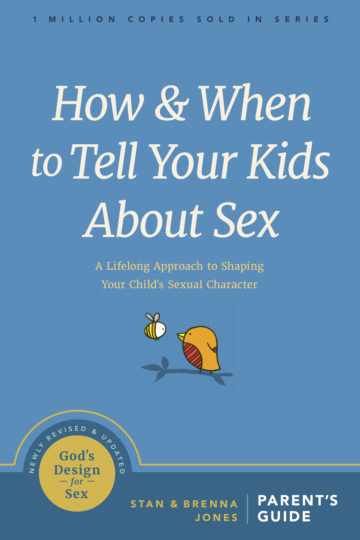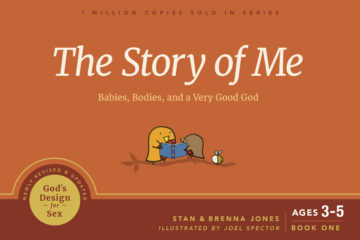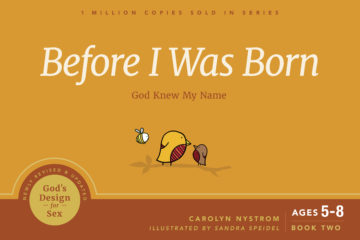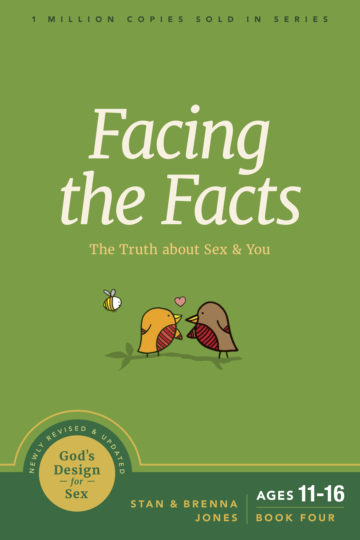Our Approach to Christian Sex Education in the Family
This is the General Introduction to each of the four children’s books in the God’s Design for Sex book series by Stan and Brenna Jones. Copyright © 1993, 2007, 2019. Used by permission of NavPress. All rights reserved. Represented by Tyndale House Publishers, Inc. To purchase books in the God’s Design for Sex book series, go to www.navpress.com.
Parents, God gave you your sexuality as a precious gift. And you’re reading this book [i.e., one of our 4 children’s books] because God has given you children you love as a gift flowing from your sexuality.
God gave your children the gift of sexuality as well. If handled responsibly, this gift will be a source of blessing and delight. How can parents help make this happen?
Many forces will push children to make bad choices about sex based on false beliefs and values and on misplaced spiritual priorities. These forces are more powerful, confusing, persuasive, and ever present today than ever in history, thanks to the power of social media and the confusion of our culture. From their earliest years, children are bombarded with destructive, misleading messages—messages about the nature of sexual intimacy, about marriage, about family, about the boundaries of godly sexual expression, and even about the basic creational design of humanity as male and female.
These messages come from everywhere—through music, television, the Internet, discussions with their friends, school sex-education programs, and many other sources. The result? Confusion, doubt, and shame, as well as distressing rates of sexual experimentation, teen pregnancies, abortion, sexually transmitted diseases, divorce, and devastated lives.
We believe that God means for Christian parents to be their children’s primary sex educators. First messages are the most powerful—why wait until your children hear distorted views and then try to correct the misunderstanding? Sexuality is a beautiful gift—why not present it to your children the way God intended? God’s Word is trustworthy and true—why not teach your children how to understand and live by its guidance in the area of sexuality? Why not establish yourself as the trusted expert to whom your children can turn to hear God’s truth about sexuality?
The God’s Design for Sex series is designed to help parents shape their children’s character, particularly in the area of sexuality. Sex education in the family is less about giving biological information and more about shaping your children’s moral characters. The earlier you start helping your children see themselves as God does, including in the area of sexuality, the stronger your children will be as they enter the turbulent teenage years.
How and When to Tell Your Kids about Sex is a parents’ resource manual in which we offer a comprehensive understanding of what parents can do to shape their children’s sexual character. [The “weightlifter” diagram here is our graphic summary of our 5 factors of character: needs, beliefs, values, skills, and supports. ] The four children’s books in this series are designed
 for parents and children to work through together. Those books are structured to be read with your children at ages three to five (The Story of Me), five to eight (Before I Was Born), eight to twelve (What’s the Big Deal?), and twelve to sixteen (Facing the Facts). These age ranges are not strict formulas; you need to exercise your judgment about your children’s maturity levels, environments, needs, and so forth to decide when and how to introduce the books.
for parents and children to work through together. Those books are structured to be read with your children at ages three to five (The Story of Me), five to eight (Before I Was Born), eight to twelve (What’s the Big Deal?), and twelve to sixteen (Facing the Facts). These age ranges are not strict formulas; you need to exercise your judgment about your children’s maturity levels, environments, needs, and so forth to decide when and how to introduce the books.
The four children’s books are meant to provide the foundational information kids need. Further, they are to be starting points for you to build upon and personalize as you discuss sexuality with your children in an age-appropriate manner. They provide an anchor point for discussions in order to jump-start deeper explorations. These books help break the silence and put the issues out on the table.
Don’t simply hand these books to your children to read, because our whole point is to empower you as the parent to shape your children’s sexual characters. The books are meant to start and shape conversations between you and your children and to deepen your impact on your children in the area of sexuality.
In this series, we address controversial topics about which Christians disagree, including masturbation, how far people should go sexually when they’re dating, contraception, gender identity, homosexuality, and more. Our goal in doing so is not to presumptuously present our answers as completely right but rather to encourage you to reach reasoned conclusions and to teach your children as you see fit before the Lord.
We have tried in each book to present information that we believe children of that age must have, without presenting controversial topics “too early.” Your child may be confronted with complicated and confusing issues at a much earlier age than you expect. In such cases, you can draw on our discussions in later books to inform your dialogue with your child. For instance, we hold off discussing sexual orientation until the book for eight- to twelve-year-olds (What’s the Big Deal?), and on discussion of gender identity and transgender issues until the book for twelve to sixteen-year-olds (Facing the Facts). But your child may need more basic information much earlier, and in such cases, we urge you to use or adapt material from this book and our books for older children to meet your child’s needs.
Why start early? Because if you as the parent are not teaching your children about sexuality, your children will learn distorted lessons about sexuality from television, the Internet, and playground conversations. If you are silent on sex while the rest of the world is abuzz about it, your children will learn that you cannot help in this key area. If you teach godly, truthful, tactful, and appropriate lessons about sexuality, your children will trust you more and see you as a parent who tells the truth.
We’ll briefly unpack each of the books at more length to help you discern which would be most helpful to you in your current parenting season.
Parent Resource: How and When to Tell Your Kids about Sex: A Lifelong Approach to Shaping Your Child’s Sexual Behavior
 This book is the parents’ comprehensive resource manual for the God’s Design for Sex series. We take on the hardest subjects, such as sexual abuse, gender identity, and homosexuality, helping you know when and how to bring up these subjects. Our goals for How and When to Tell Your Kids about Sex are to:
This book is the parents’ comprehensive resource manual for the God’s Design for Sex series. We take on the hardest subjects, such as sexual abuse, gender identity, and homosexuality, helping you know when and how to bring up these subjects. Our goals for How and When to Tell Your Kids about Sex are to:
- help you understand your role in shaping your child’s character, including his or her views, attitudes, and beliefs about sexuality;
- instruct you in the 12 key principles for Christian sex education in the home and how to implement the strategies and tactics suggested by these principles;
- familiarize you with the challenges that your children will face from secular culture and empower you with strategies and skills to help them overcome those challenges;
- ground your understanding of God’s view of our sexuality;
- equip you and your children to explain and defend the traditional Christian view of sexual morality in these modern times;
- examine each major developmental stage of your child’s life and share age-appropriate information and approaches;
- address directly the most complex issues you and your child might or will face in today’s culture in a manner grounded in biblical thinking and informed by the best contemporary science;
- explore how you can most powerfully influence your child to live a life of sexual chastity; and
- equip you to provide children with the strengths necessary to stand by their commitments to traditional Christian morality.
As you read the following descriptions of each of the books for your children, please know that the concepts and issues presented in each of these books flow directly from the background provided by this foundational parents’ guide.
Ages Three to Five: The Story of Me
 Your most important task with your young children is to lay a spiritual foundation for their understanding of sexuality. God loves the human body (and the whole human person), and the body is included in what God called “very good” (Genesis 1:31). Children’s bodies, their existences as boys or girls, and also their sexual organs are gifts from God.
Your most important task with your young children is to lay a spiritual foundation for their understanding of sexuality. God loves the human body (and the whole human person), and the body is included in what God called “very good” (Genesis 1:31). Children’s bodies, their existences as boys or girls, and also their sexual organs are gifts from God.
Young children can begin to develop a wondrous appreciation for God’s marvelous gift of sexuality by understanding some of the basics of fetal development. In this book, we discuss the growth of a child inside a mother’s body and the birth process. With such instruction, young children begin to develop a trust for God’s law and to see God as a lawgiver who has the best interests of his people at heart. God is the giver of good gifts!
Finally, we want children to see families grounded on the lifelong marital union of one man and one woman as God’s intended framework for the nurture and love of children. If you are reading the book as a single parent or with an adopted child, you will have opportunity to talk about how God sometimes creates and blesses alternative forms of families. We hope that you will find The Story of Me a wonderful starting point for discussing sexuality with your young children.
Ages Five to Eight: Before I Was Born (by Carolyn Nystrom, with Stan and Brenna Jones)
 Before I Was Born emphasizes the creational goodness of our bodies, our existences as men and women, and our sexual organs. This book introduces new topics as well, including the growth and changes boys and girls experience as they become men and women.
Before I Was Born emphasizes the creational goodness of our bodies, our existences as men and women, and our sexual organs. This book introduces new topics as well, including the growth and changes boys and girls experience as they become men and women.
It includes a tactful but direct explanation of sexual intercourse between husbands and wives. God wants sexual intercourse limited to marriage, because sexual intercourse brings husbands and wives close together in a way that honors God and helps to build strong families.
Parents often ask, “Do my kids really need to know about sexual intercourse this early?” Remembering that you are the decision-maker as to whether you give this book to a very mature five-year-old or to a more slowly maturing eight-year-old, the answer is yes. We believe this is a strategic decision parents must face based on their individual children, considering that first messages are always the most powerful messages. If, as a Christian parent, you want to begin to shape godly attitudes in your children about sex, why would you wait until they first soak in the misperceptions of the world? Why not build godly attitudes and views from the foundation up?
If you’re reading this with an adopted child, use this opportunity to explain that not every couple will have children. If a baby doesn’t grow in the wife’s womb, the couple might look for a baby to adopt. “Even though the baby grew inside of a different mother, the husband and wife love this baby very much.” This is another way that God makes families.
Ages Eight to Twelve: What’s the Big Deal?: Why God Cares About Sex
 This book reinforces the messages of our first two children’s books, covering the basics of sexual intercourse and the fundamental creational goodness of our sexuality. It continues the task of deliberately building children’s understanding of why God intends sexual intercourse to be reserved for marriage.
This book reinforces the messages of our first two children’s books, covering the basics of sexual intercourse and the fundamental creational goodness of our sexuality. It continues the task of deliberately building children’s understanding of why God intends sexual intercourse to be reserved for marriage.
This book goes further than the earlier books, adding more of the facts your children will need to know as they approach puberty. Further, it will help you begin the process of inoculating your children against the negative moral messages of the world. In How and When to Tell Your Kids About Sex, we argue that Christian parents should not try to completely shelter their children from the destructive moral messages of the world. If they mature in environments where they are not exposed to germs, children grow up with depleted and ineffectual immune systems for resisting disease. When parents shelter their children too much, children are left naive and vulnerable; parents risk communicating that the negative messages of the world are so powerful that Christians cannot even talk about them.
But neither should you let your children be inundated with society’s destructive messages. The principle of inoculation suggests that you should deliberately expose your children to the contrary moral messages they will hear from the world. It should be in your home that your children first learn that many people in our world do not believe in reserving sex for marriage, and it should be in your home that your children first understand such problems as pornography, teenage pregnancy, gay marriage, sexual identity and gender issues, and so forth. In this way, you can help build your children’s defenses against departing from God’s ways.
Ages Twelve to Sixteen: Facing the Facts: The Truth about Sex and You
 Facing the Facts: The Truth about Sex and You builds upon all that has come before but also—in more depth—prepares your children for puberty. At this age, your children are old enough for more detailed information about the changes their bodies are about to go through and about the adult bodies they will soon receive as gifts from God.
Facing the Facts: The Truth about Sex and You builds upon all that has come before but also—in more depth—prepares your children for puberty. At this age, your children are old enough for more detailed information about the changes their bodies are about to go through and about the adult bodies they will soon receive as gifts from God.
In this book, your children will hear again about God’s view of sexuality and about his loving and beautiful intentions for how this gift should be used. The distorted ways in which our world views sex must be clearly labeled, and your children must be prepared to face views and beliefs contrary to those they learn at home. We attempt to do all this while also talking about the many confusing feelings of puberty and early adolescence.
While children could read this book independently, we do not believe this would be optimal. We encourage you to read it separately but at the same time as your child and then talk about it together. You could go chapter by chapter. Alternatively, you can read it and use it as a resource for important conversations with your soon-to-be or young teenager.
In this book, we address the most controversial topics of the series, topics about which biblically grounded Christians can and do frequently disagree. We make suggestions about appropriate moral positions on all of the important issues, including sexual-intimacy limits before marriage, masturbation, contraception, gender identity, homosexuality, and more.
* * * * * * * * * * * * * * * * * *
We have joked that in each of these books, we are guaranteed to say something to lead almost any Christian parent to declare us too conservative or too liberal on some topic or to disagree with us somewhere. We do not presume our answers are completely right. At the very least, we hope our thoughts empower you, the parent, to think the matter through and present a better answer to your children as the Lord guides your thinking.
All of these books were written as if dialogue is an ongoing reality between mother, father, and child. Yet in some homes, only one parent is willing to talk about sex. Many Christian parents shoulder the responsibility of parenting alone due to separation, divorce, or death. Grandparents sometimes must raise their grandkids. We’ve tried to be sensitive to adoptive families and families that do not fit the mold of the traditional nuclear family, but we cannot anticipate or respond to all the unique needs of families. Use these books with creativity and discernment to meet the needs of your situation.
We hope these books will be valuable tools in raising a new generation of faithful Christian young people. If you follow this plan, we believe your children will have healthy, positive, accepting, godly attitudes about sexuality. As unmarried people, your children will be more likely to live confident, chaste lives as faithful witnesses to the work of Christ in their lives. If your children do marry, they will have fulfilled, loving, rewarding lives as husbands or wives. It is our prayer that this curriculum will encourage and equip you to dive into the wonderful work of shaping your children’s sexual characters.




